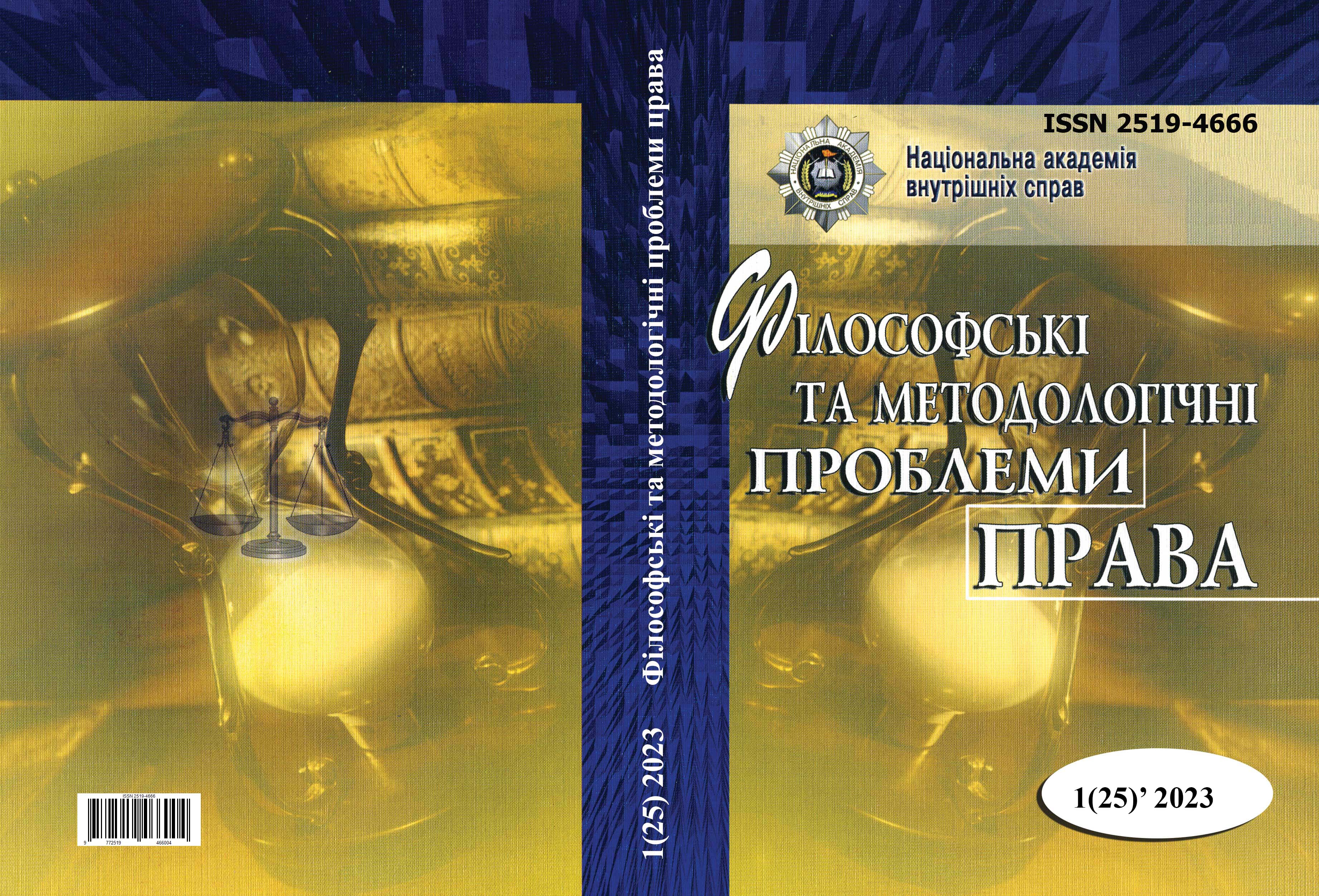Philosophical Dimension of Government Legitimacy During the Period Of Existential War: the Experience of Ukraine in the XX–XXI Centuries
Abstract
Abstract. The purpose of the article is to use the example of Ukrainian statehood to carry out a doctrinal analysis of the nature of the legitimacy of Ukrainian power and its factors during the period of Russia's permanent existential war against Ukraine, both in historical retrospect and with a political and legal analysis in the conditions of martial law. The methodological basis of the research is based on general scientific and special legal methods. The key is an axiological approach using comparative law, historical, epistemological, content analysis, dialectical and other methods of scientific research. The scientific novelty consists in the philosophical and legal reflection and development of specific proposals regarding the further legal and organizational improvement of the work of state institutions, strengthening the legitimacy of the government in the conditions of permanent threats from the historical enemy of Ukraine – the Russian Federation. An analysis of the nature of the legitimacy of the government in the conditions of martial law and historical retrospect with modeling of future challenges based on the political and legal experience of Ukrainian state-building was carried out. The main factors of the legitimacy of the government in a democratic society are recognized as the level of trust in the electoral system and the turnout of voters, the quality of laws and other normative acts (compliance of the written norm with the real possibility of its enforcement), a politically impartial and professional state apparatus, the stability and uninterrupted work of institutions during the period of the special legal regime martial law or state of emergency, the level of public trust in state institutions, compliance of government actions with the norms of the Constitution of Ukraine and the achievement of legitimate goals of their implementation. The practical significance of the study of the outlined issues lies in the possibility of developing the most effective models of political forecasting and state-building
Keywords: legitimacy; constitutionalism; power; democracy; war; martial law; sovereignty; philosophy; state institutions; policy; parliament; state formation
Downloads
References
30 років тому. Референдум 1991 року про незалежність України і розпад СРСР (архівні фото). URL: https://www.radiosvoboda.org/a/referendum-pershoho-hrudnia-1991-roku-pro-nezalezhnist-ukrayiny-arkhivni-foto/30287132.html.
Арон Р. Опій інтелектуалів. Київ : Юніверс, 2006. 272 с.
Bellamy R. Political Constitutionalism and Populism. Journal of Law and Society. 2022. P. 1–25. doi: 10.1111/jols.12401.
Dellmuth L., Aart Scholte J., Tallberg J., Verhaegen S. Legitimacy in Global Governance. Chapter 1. Citizens, Elites, and the Legitimacy of Global Governance. Oxford : Oxford University Press, 2022. P. 3–24.
Koch C. Varieties of populism and the challenges to Global Constitutionalism: Dangers, promises
and implications. Global Constitutionalism. 2021. Vol. 10. Issue 3. P. 400–438. doi: 10.1017/S2045381719000455.
Костицький М. В. Ключові підходи до методології пізнання української історико-правової дійсності. Науково-інформаційний вісник. 2015. № 12. С. 12–17. URL: http://www.irbis-nbuv.gov.ua/cgi-bin/irbis_nbuv/cgiirbis_64.exe?C21COM=2&I21DBN=UJRN&P21DBN=UJRN&IMAGE_FILE_DOWNLOAD=1&Image_file_name=PDF/Nivif_2015_12_3.pdf.
Mazzoleni O., Voerman G. In the Name of Sovereignty. Right-Wing Populism and the Power of the Judiciary in Western Europe. Partecipazione e Conflitto. University of Salento (Italy). 2021. Vol. 13. No. 3. doi: 10.1285/i20356609v13i3p1417.
Mudde C., Kaltwasser C. Populism: a very short introduction. New York : Oxford University Press, 2017. 52 р.
Pike J. The law does not exist to guide us. Jurisprudence : An International Journal of Legal
and Political Thought. Routledge. 2023. Vol. 14. Issue 1. P. 95–112. doi: 10.1080/20403313.2022.2141509.
Верховенство права : доповідь, схвалена Венеційською Комісією на 86-му пленарному засіданні (Венеція, 25–26 берез. 2011 р.). URL: https://supreme.court.gov.ua/userfiles/CDL_AD_2011_003_ rev_2011_04_04.pdf.
Tushnet M., Bugaric B. Power to the People: Constitutionalism in the Age of Populism. Oxford University Press, 2021. 294 p.
Трансформація партійної системи: український довід у європейському контексті / за ред. Ю. Якименка. Київ : Центр Разумкова, 2017. 381 с.
Abstract views: 192 PDF Downloads: 181
Copyright (c) 2023 Philosophical and Methodological Problems of Law

This work is licensed under a Creative Commons Attribution-NonCommercial-NoDerivatives 4.0 International License.
- Authors reserve the right to authorship of their own work and transfer to the magazine the right of the first publication of this work under the terms of the Creative Commons Attribution License, which allows other persons to freely distribute published work with mandatory reference to authors of the original work and the first publication of an article in this magazine.
- Authors have the right to enter into separate additional agreements on non-exclusive dissemination of the work in the form in which it was published in the journal (for example, to post an article in the institution's repository or to publish as part of a monograph), provided that the link to the first publication of the work in this journal is maintained.
- The journal's policy allows and encourages the posting of articles by authors on the Internet (for example, in electronic storehouses of institutions or on personal websites), both before the submission of this manuscript to the editorial office and during its editorial processing, as this contributes to the creation of a productive scientific discussion and positively affects the efficiency and dynamics of citing the published work.




